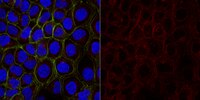MAB1620-AF647 Sigma-AldrichAnti-Cytokeratin 5,6 Antibody, clone D5/16B4, Alexa Fluor® 647
Anti-Cytokeratin 5,6 Antibody, clone D5/16B4, Alexa Fluor® 647 is an antibody against Cytokeratin 5,6 for use in Immunocytochemistry.
More>> Anti-Cytokeratin 5,6 Antibody, clone D5/16B4, Alexa Fluor® 647 is an antibody against Cytokeratin 5,6 for use in Immunocytochemistry. Less<<Recommended Products
Overview
| Replacement Information |
|---|
Key Spec Table
| Species Reactivity | Key Applications | Host | Format | Antibody Type |
|---|---|---|---|---|
| M, H, R | ICC | M | AlexaFluor®647 | Monoclonal Antibody |
| References |
|---|
| Product Information | |
|---|---|
| Format | AlexaFluor®647 |
| Presentation | Purified mouse monoclonal IgG1 antibody conjugate in PBS with 15 mg/mL BSA and 0.1 % sodium azide. |
| Quality Level | MQ100 |
| Physicochemical Information |
|---|
| Dimensions |
|---|
| Materials Information |
|---|
| Toxicological Information |
|---|
| Safety Information according to GHS |
|---|
| Safety Information |
|---|
| Storage and Shipping Information | |
|---|---|
| Storage Conditions | Stable for 1 year at 2-8°C from date of receipt. |
| Packaging Information | |
|---|---|
| Material Size | 100 µL |
| Transport Information |
|---|
| Supplemental Information |
|---|
| Specifications |
|---|
| Global Trade Item Number | |
|---|---|
| Catalogue Number | GTIN |
| MAB1620-AF647 | 04055977331899 |
Documentation
Anti-Cytokeratin 5,6 Antibody, clone D5/16B4, Alexa Fluor® 647 SDS
| Title |
|---|
Anti-Cytokeratin 5,6 Antibody, clone D5/16B4, Alexa Fluor® 647 Certificates of Analysis
| Title | Lot Number |
|---|---|
| Anti-Cytokeratin 5,6, clone D5/16B4, -Q2663601 | Q2663601 |
| Anti-Cytokeratin 5,6, clone D5/16B4, Alexa Fluor® 647 - 3211292 | 3211292 |







